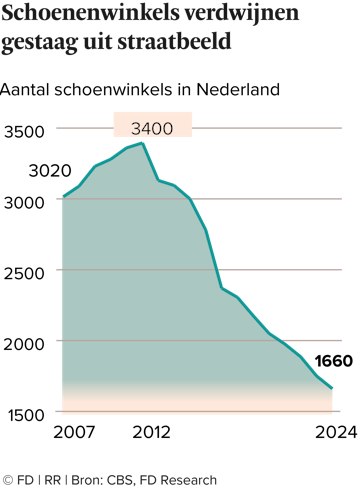Van Lier and Van Bommel, the two best-known Dutch shoe brands, are particularly affected. The two-hundred-year-old family business Van Lier, based in Breda, reported a loss in the last fiscal year, selling over ten thousand pairs less than expected, according to owner Geert van Spaendonck. The even older Van Bommel, from Moergestel, also posted losses in the last two reporting years.
This downturn impacts nearly the entire Dutch leather and footwear industry, which once thrived around Waalwijk. Shoe stores are disappearing from city centers, with fewer than half of the 3,400 stores in 2012 still in operation today.
Market Shift Towards Sneakers
Traditional men’s dress shoes are struggling, even for brands like Van Bommel and Van Lier, where they now account for only a small fraction of sales. "Dress shoes are a tough sell," says Jaco Flach, owner of the Rehab shoe brand. "We’ve seen the same in our own collection. Dress shoes used to represent 50% to 60% of revenue, now it’s down to just 10%."
Twelve years ago, Flach sold Rehab to Unlimited Footwear, but he repurchased it earlier this year after that company went bankrupt. Another Dutch brand, Nubikk, was also bought back from bankruptcy by its founder, Daan Baeten, who continues to operate it independently after selling it five years ago.
Many of Unlimited Footwear’s products were manufactured in Asia, which led to supply chain issues, according to Flach. "We produce Rehab in Portugal, as do most Dutch brands. This avoids a five-week shipping delay. Our shoes are sold mainly through premium shoe and clothing retailers, like Only for Men or Van Uffelen."
Translation: Shoe stores are steadily disappearing from the streets.
Number of shoe stores in the Netherlands.
Fewer Brand-Specific Stores
"The trend of opening brand-exclusive stores is over," says Mike van Snek, CEO of HVEG, which recently acquired Dutch brands Fred de la Bretoniere and Shabbies. "Owning retail locations is just too expensive. You need at least two staff members, and rents are high. Fred de la Bretoniere used to have stores, but no longer."
These days, shoe producers rely more on online sales and multi-brand retailers, though these stores also face challenges. Luxury shoe retailer Shoebaloo closed its doors in 2023, partly due to shoe manufacturers opening their own stores. The struggling shoe chain Van den Assem was acquired this year by fashion company Omoda from Zierikzee.
Amsterdam-based shoe brand ETQ, which went bankrupt in 2022, has transitioned to a fully online business model. "E-commerce has expanded consumer choice," says Sebastian Monteban, who relaunched the brand. "If you think too locally or don’t understand e-commerce, you could miss the mark." The company now focuses on international expansion, with local inventories in various countries.
High-End Sneakers
Despite the challenges in the broader footwear sector, some Amsterdam-based producers of high-end sneakers priced over €200 are performing relatively well. "It’s not easy; this year has been challenging across the market," says Guillaume Philibert, founder of the international brand Filling Pieces. He notes a shakeout in the industry. "But this also opens space for new brands."
Philibert does not disclose Filling Pieces' revenue but confirms that the brand is growing and profitable. "I like to think our success comes from our creativity and focus on brand experience, where we’re willing to invest. We were early adopters of online sales and have an extensive international retail presence. Additionally, being independent gives us flexibility—we were the first independent brand after Van Lier and Van Bommel."
Mason Garments, another independent brand operating near Schiphol, also values its autonomy. "What sets us apart from most Dutch brands is that we’ve always operated 100% independently, with no external investors or shareholders," says Managing Director Soufyan el Hammouti.
Another distinguishing factor is Mason’s choice to manufacture in Italy, a country renowned for fashion quality. "Italy represents the pinnacle of fashion quality," says El Hammouti, though this comes at a cost. "Our prices start at €285, which places us in a higher price bracket. This makes the brand less vulnerable to cost increases; raising prices from €285 to €295 has less impact."
The brand is looking to expand but is taking a cautious approach. "We handle a lot internally and are selective in hiring. We currently generate €20 million in revenue with fewer than 20 employees, which might slow our growth a bit. We’ve been around for more than ten years, and are only now considering opening a store in Amsterdam."
Source and image: Het Financieele Dagblad
Het Financieele Dagblad: Dutch Shoe Industry Battles to Survive
The Dutch shoe industry is facing tough times. Classic brands from Brabant are reporting losses, while others are struggling to recover after bankruptcy. Rising production costs, overdue tax repayments, and a hesitant consumer base are putting pressure on the market. Some high-end sneaker producers in Amsterdam, however, are faring somewhat better.




